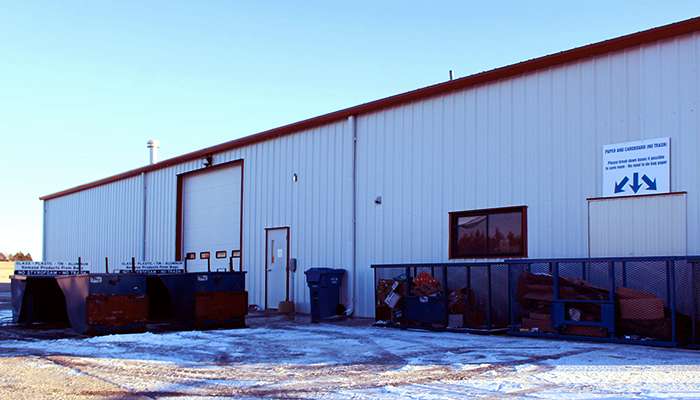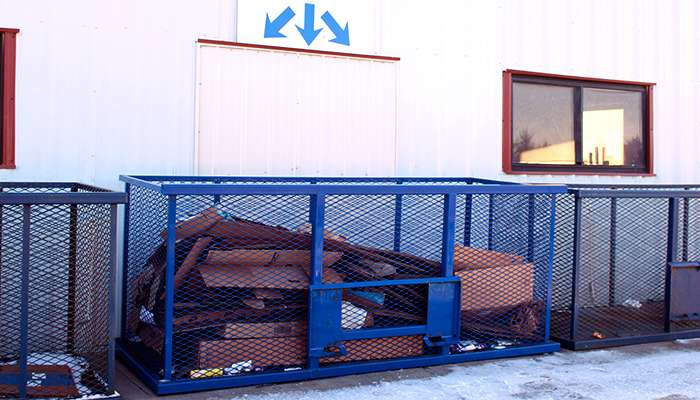
By CRISTINA JANNEY
Hays Post
Changes in the recycling market are resulting in changes across the state in the way cities see recycling.
The City of Newton recently decided to end mandatory recycling, and the City of El Dorado closed its recycling operation completely, as it was deemed to no longer be economically sustainable.
Marvin Honas, Hays superintendent of solid waste, said at this point, the City of Hays is not considering ending its recycling program.
However, it is watching the recycling industry closely and was waiting for the renegotiation of its contract with Waste Connections for its plastic recyclables. That contract was supposed to be renegotiated in December. Honas said he was anticipating a price increase.
In 2017, China announced an import ban on many grades of recycled materials. The ban was implemented in 2018. India has also threatened to end imports of U.S. plastics.
Since 2009 the amount of plastics that are being recycled domestically has increased compared to the amount of plastic recyclables being exported. Domestic processing made a significant jump after China's announcement in 2017, according to data from news website Recycling Resource.
As recycling operations across the United State implemented single-stream recycling, U.S. recyclables became increasingly "dirty," Honas said. This means items that could not be recycled were making it into the recycling stream and not being sorted out before they were shipped abroad.
Buyers, such as China, which was one of the U.S.'s largest purchasers of recyclables, ended up with unrecyclable waste.
"They were paying for recyclables and having to throw away 35 percent of it in their landfills," Honas said.

Honas called Hays recyclers "super troopers." Hays recyclers have a good record of producing a very clean recycling stream. However, Hays' recyclables go to a facility in Hutchinson for sorting, where they are mixed with other streams that may not be as "clean," he said.
"As far as we are concerned, we don't need changes in their habits in terms of the products we are collecting," Honas said of Hays recyclers.
In addition to residential recyclers, about 70 to 100 Hays businesses voluntarily bring recyclables to the recycling center, paying their own cost to transport the materials.
The City of Hays pays for Waste Connections to sort and sell its c0-mingled materials—plastic, glass, aluminum and tin. Hays debags the material and attempts to take out any unwanted materials. Hays processes about 200 to 300 tons of co-mingled materials per year.
Cardboard and paper products are baled at the recycling center, and the city sells those directly for an average of $22 per ton, Honas said. The city process 900 to 1,000 tons of paper and cardboard per year.

Although prices have also dropped in the paper market during the last several years, Honas said the city still has buyers for the product.
Right now, the revenue from the cardboard and paper offsets the amount the city pays Waste Connections to take its co-mingled materials.
However, the city's recycling operation is not at a break-even point.
"Recycling has always cost money," Honas said. "From day one, even when the markets were good, recycling still costs money."
Recycling is still cheaper than throwing materials away, he said.
Operating recycling programs reduces the amount of materials that make it into landfills. This can reduce the amount municipalities pay in landfill tipping fees.
These fees have steadily increased, with the Ellis County implementing another increase recently. Tipping fees for Hays are $71 per ton and will increase during the next four years to $75 per ton.
As the market for plastics and other recyclables fluctuates and cities are paying more for sorting and disposal, they are seeing their budgets turned on end.
Honas said it is difficult to tell at this point what the future of recycling will be for Hays and the rest of the U.S.
"Those who are making the forecasts about recyclable material, they are fairly optimistic that it is going to be coming back if we can get our situation with China squared away," Honas said. "In the meantime, there are some other countries that are buying recyclable material."
However, those countries are not buying the quantity of recyclables that China was buying.
"As far as Hays, I don't see this impacting our recycling program at the present time until we get some better figures or outlooks into the future," he said. "I think we need to look really strong at it. We look at it every day."
Reductions in the waste stream is the optimum outcome, Honas said. Several cities across the United States have considered banning plastic bags as one step. Hays said he did not think the City of Hays would ban plastic bags, but businesses and consumers could take it upon themselves to stop using plastic bags and other plastic products.
"With the markets down, people are thinking more about how can we make ourselves utilize these products," Honas said.






